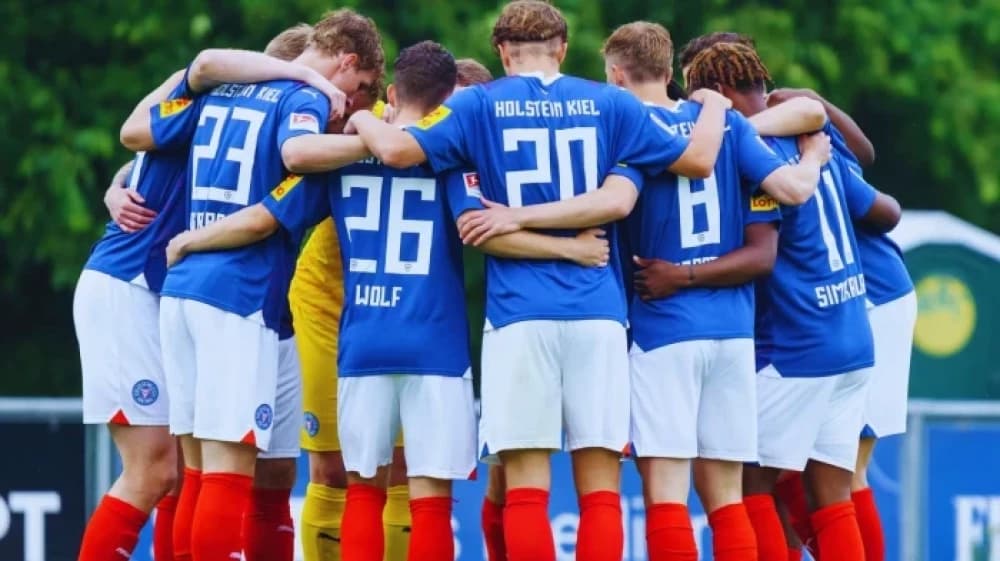
From regional dominance to historic Bundesliga promotion, Holstein Kiel’s rich legacy and modern resurgence define a club rooted in tradition and ambition.
Kieler Sportvereinigung Holstein von 1900 e.V., commonly known as Holstein Kiel or KSV Holstein, is a storied German football club based in Kiel, Schleswig-Holstein. Founded in 1900, the club has carved out a rich history in German football, particularly in the northern regions, where it was a dominant force in the early 20th century. After decades of fluctuating fortunes, Holstein Kiel achieved a historic milestone in 2024 by securing promotion to the Bundesliga for the first time, marking a new chapter in its illustrious journey.
Early Dominance and National Triumphs
Holstein Kiel’s rise to prominence began in the early 1900s when the club established itself as a powerhouse in northern German football. The club’s golden era peaked in 1912 when they clinched the German football championship, defeating Karlsruher FV 1–0 in the final. This victory remains the club’s only national championship to date, cementing its place among Germany’s elite teams of the time.
In addition to their 1912 triumph, Holstein Kiel finished as runners-up in the German championships in 1910 and 1930, showcasing their consistency at the highest level. The club also dominated regional competitions, winning six Northern German championships and finishing as runners-up nine times. These successes solidified their reputation as one of the most formidable teams in northern Germany during the pre-Bundesliga era.
Post-War Struggles and Missed Opportunities
The formation of the Bundesliga in 1963 marked a turning point in German football, but Holstein Kiel was notably absent from the new top-flight league. Despite their strong performances in the Oberliga Nord (the regional top division at the time), the club failed to secure a place in the Bundesliga and instead found themselves in the Regionalliga Nord, the second tier of German football.
The following decades were marked by instability, as Holstein Kiel oscillated between the second and third divisions. The club’s inability to regain its former glory was a source of frustration for its loyal fanbase, but the foundation for a resurgence was quietly being laid.
Modern Revival and Bundesliga Promotion
Holstein Kiel’s fortunes began to change in the 2010s. After years of rebuilding, the club earned promotion to the 2. Bundesliga in 2017, marking their return to the second division after a 36-year absence. Under the guidance of astute management and with a focus on youth development, the club established itself as a competitive force in the 2. Bundesliga and is consistently challenging for promotion.
The breakthrough finally came in the 2023–24 season, when Holstein Kiel secured automatic promotion to the Bundesliga after finishing in the top two of the 2. Bundesliga. A 1–1 draw against Fortuna Düsseldorf on 11 May 2024 sealed their historic achievement, sparking celebrations among players, staff, and fans alike. This milestone marked the culmination of years of hard work and determination, as Holstein Kiel prepared to compete in Germany’s top division for the first time in their history.
A Legacy of Resilience and Ambition
Holstein Kiel’s journey is a testament to the club’s resilience and commitment to its roots. From their early dominance in northern German football to their modern-day resurgence, the club has consistently demonstrated an ability to adapt and evolve. The promotion to the Bundesliga is not just a sporting achievement but also a reflection of the club’s enduring legacy and its connection to the city of Kiel and its passionate supporters.
Infrastructure and Youth Development
Central to Holstein Kiel’s success has been its investment in infrastructure and youth development. The club’s home ground, Holstein-Stadion, has undergone numerous renovations to meet modern standards, providing a vibrant atmosphere for fans and players alike. With a capacity of approximately 15,000, the stadium has witnessed some of the club’s most memorable moments, including their promotion-clinching match in 2024.
The club’s youth academy has also played a pivotal role in its resurgence. By focusing on developing homegrown talent, Holstein Kiel has not only built a competitive squad but also maintained financial sustainability. The academy’s emphasis on technical skills, tactical awareness, and physical conditioning has produced several players who have gone on to succeed in higher divisions.
Key Achievements and Memorable Moments
Significant achievements and unforgettable matches punctuate Holstein Kiel’s history. Their 1912 German championship victory remains the club’s crowning glory, while their runs to the finals in 1910 and 1930 further underscored their status as a top-tier team. In more recent years, the club’s 2020–21 DFB-Pokal campaign saw them eliminate Bayern Munich in a dramatic penalty shootout, a victory that will forever be etched in the memories of their fans.
The 2023–24 promotion to the Bundesliga stands as the club’s most significant achievement in the modern era. It represents the culmination of years of hard work, strategic planning, and unwavering support from the club’s loyal fanbase.
Rivalries and Fan Culture
Holstein Kiel’s rivalries with FC St. Pauli and Hamburger SV are deeply rooted in regional pride and historical encounters. Matches against these clubs are fiercely contested, with passionate fanbases creating an electric atmosphere. The club’s supporters, known for their loyalty and resilience, have been instrumental in driving the team forward during both triumphant and challenging times.
Traditional chants, vibrant matchday experiences, and a strong sense of community characterize the club’s fan culture. Holstein Kiel’s supporters have stood by the team through decades of lower-league football, making their Bundesliga promotion all the more rewarding.
Looking Ahead: Challenges and Opportunities
As Holstein Kiel prepares for their debut Bundesliga season, the challenges are significant. Competing against Germany’s elite clubs will require a step up in quality and consistency. The club’s primary objective will be to secure their top-flight status, while also continuing to develop young talent and strengthen their squad.
Financially, the increased revenue from Bundesliga participation provides an opportunity to invest further in infrastructure and player development. The club’s long-term vision is to establish itself as a stable Bundesliga side, capable of competing for mid-table finishes and making deep runs in domestic cup competitions.
Conclusion: A New Era for Holstein Kiel
Holstein Kiel’s promotion to the Bundesliga is more than just a sporting achievement; it is a celebration of the club’s rich history, resilience, and ambition. From their early dominance in northern German football to their modern-day resurgence, Holstein Kiel has consistently demonstrated an ability to overcome challenges and achieve greatness.
As they embark on their first Bundesliga campaign, the club’s focus on youth development, community engagement, and sustainable growth will be key to their long-term success. Holstein Kiel’s journey is a testament to the enduring power of tradition, passion, and perseverance in the world of football. The future is bright for this historic club, and their story is far from over.
This detailed rewrite captures the essence of Holstein Kiel’s history, achievements, and future ambitions, providing a comprehensive overview of the club’s journey from regional dominance to Bundesliga glory.





